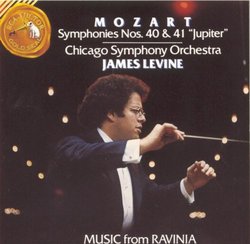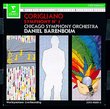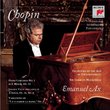| All Artists: Wolfgang Amadeus Mozart, James Levine, Chicago Symphony Orchestra Title: Mozart: Symphony Nos. 40 & 41 Members Wishing: 0 Total Copies: 0 Label: RCA Original Release Date: 1/1/1981 Re-Release Date: 6/8/1993 Genre: Classical Styles: Historical Periods, Classical (c.1770-1830), Symphonies Number of Discs: 1 SwapaCD Credits: 1 UPC: 090266139729 |
Search - Wolfgang Amadeus Mozart, James Levine, Chicago Symphony Orchestra :: Mozart: Symphony Nos. 40 & 41
 | Wolfgang Amadeus Mozart, James Levine, Chicago Symphony Orchestra Mozart: Symphony Nos. 40 & 41 Genre: Classical
|
Larger Image |
CD DetailsSimilarly Requested CDs
|
CD ReviewsMozart on a sugar high R. M. Rogers | United States | 06/01/2005 (5 out of 5 stars) "This recording is more of a guilty pleasure for me. As a music educator with decades of experience, I know that Levine's tempos are faster than they should be, I know that the balance is a little violin heavy, I know that there are more accurate interpretations of these works on CD, but....... .......this recording is just so much more fun. The first two movements of K550 are very nicely done. Levine observes the repeats which in my opinion adds to the first movement but detracts from the second as it is lengthened to a full fifteen minutes. The minuet/trio is a tad faster than most conductors choose to take it but the movement is played very well, especially the horn section during the trio. The finale to K550 alone is worth the price of the recording, if nothing else to wonder in amazement how the CSO managed to play so clean at that speed. It's really REALLY fast, and yet tightly performed. Levine repeats BOTH the exposition and the development/recapitulation yet still manages to get the movement finished in less than nine minutes. It's a fun ride. K551 is played in a similiar fashion, with repeats taken, faster tempos, and a needlessly long second movement. The outer movements especially sound grand and exciting. My only complaint is that the fugal coda section of the finale loses some of its impact because the bottom voices are sometimes smothered by the violins. Overall, this is a great recording. The music is very solid, the digital production is crystal clear, and it's a LOT of fun to listen to. However, it should not be one's ONLY recording of these masterpieces. Purchase it alongside the accepted definitive recordings of Bohm, Marriner, and Mackerras. Put those on display and listen to this one when nobody else is watching." Speed demon R. M. Rogers | 09/07/2003 (4 out of 5 stars) "It is a fine recording, but I have to wonder whether Mozart really intended this to be played so fast that individual notes become unrecognizable, as the violins race up and down the scales. Some of it should be played this fast of course, like the last movement of S41, but most of the other movements are played faster than Bohm and Marriner for example, both of whom in comparison I prefer.Levine adopts a very aggressive violin-heavy treatment that tends to muddy some of the runs, particulary in the last movement of S40, which abandons all caution and drowns most of the other instruments in an unrestrained string assault. Some of the last movement of S41 sounds like the banjo competition in "Deliverance", several racing violins brought to the front of the mix and sounding almost like country "fiddling". Another problem with the speed and power is that it tends to accentuate rough spots in these pieces. As has been pointed out, they were written quickly in Mozart's last year, and he almost certainly never heard them performed. In these transitions, Levine has to put on the brakes and then go charging off in another direction, whereas a slower tempo smooths out the music. I was never more aware that these were perhaps unpolished works than in listening to Levine. That said, this version has high points. The second movement of S40 is particulary nice, a pulsing treatment stretched out to 15 minutes (twice as long as Marriner), and carried with such power that it can hold the attention. It's also the best for putting the emphasis on the melodies. S40 and S41 in this context are like rock songs with "hooks", and Levine really leans on them, to good effect. But this approach makes him too abrupt in the second movement of S41; it doesn't flow as well, the volume rachets up and down too quickly, rather than swelling.I like this though, very much. His approach is certainly exciting, and it makes for great driving music on a dark night with the window open, where the extra speed and mid-range violin punch is welcome. That's where I keep this CD, in the car. The other more domesticated versions live inside.Can you have too much S40 and S41? Probably not. Imagine, Mozart tosses these off in two months. What would have S42 sounded like? S50? It's almost unbearable to think about the loss." Pure Magnificance D. Dubei | New York, NY | 06/11/2002 (5 out of 5 stars) "This is the absolute best recording of Mozart's 40th and 41st Symphonies that i have heard. both are crisp and clean. what's more, Levine conducts the 41st with pure passion and allows the music to breathe vitality and life. the 41st is by far Mozart's best music, shown by how this entire symphony flows like a river, never breaking apart, but rather moving freely from one melody to another."
|

 Track Listings (8) - Disc #1
Track Listings (8) - Disc #1







